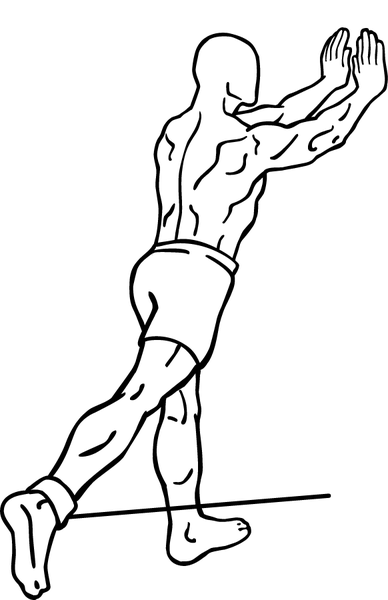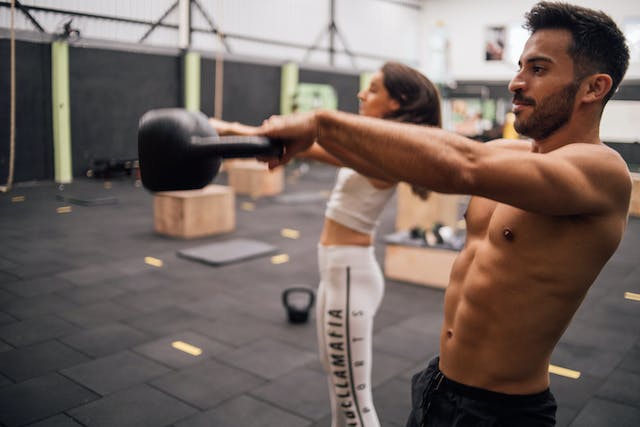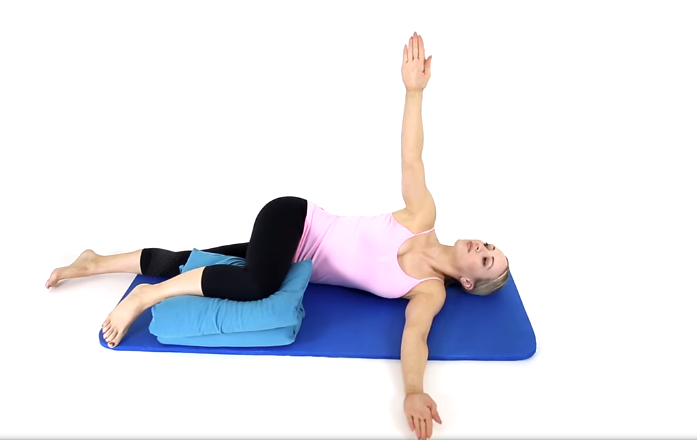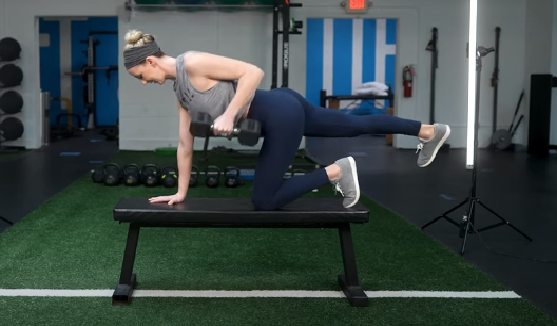Cable glute kickbacks is one of the common exercises in fitness centers, and it is one of the compound exercises that makes a huge difference in the strength of the glutes, hamstrings, and even the hips. The cable glute kickbacks exercise helps exhaust the muscles in the back of the leg and stimulates them to be active and gain flexibility.
In this post, we will learn about this wonderful exercise, its advantages, and the correct ways to do it safely and get good results. We will also learn about some mistakes that you must avoid, and we will learn about some reliable alternatives that are also in place of this exercise.
What is a cable glute kickback ?
Pioneers of fitness centers rely on the cable glute kickback exercise to improve the strength of the leg muscles and stimulate them to grow and gain muscle. It is a compound exercise that engages a group of muscles and occupies more than one joint (hip, knee).
The exercise is performed with a cable machine, so that the cable machine is adjusted to a low position, then the cable strap is attached to the ankle, and then you start kicking your foot backwards, a step away from the cable machine.
The role of this exercise lies in improving muscle functions as well as preparing them to participate in other compound exercises such as squats or deadlifts because it works as an auxiliary exercise and not as a main strength exercise.
If you want to develop the fitness of the lower body, the glute kickback exercise will be a strong addition along with the rest of the other exercises and helps to get quick results.
- Mechanics : Compound
- Utility : Auxiliary
- Force : Push

Cable glute kickback : Muscle worked
The cable glute kickback targets the main muscles of the lower body, starting with the glutes (the gluteus maximus is mainly targeted), then the hamstrings act as a dynamic stabilizer during knee flexion and extension, in addition to the gluteus medius, minimus and obliques as stabilizers.
According to EXRX the Glute Kickback Cable, the following muscles are targeted:
Target :
- Gluteus Maximus
Synergist :
- Adductor Magnus
Dynamic stabilizer :
- Hamstrings
Stabilizers :
- Gluteus Medius
- Gluteus Minimus
- Erector spinae
- Obliques
Cable glute kickback guide
The glute kickback is an easy exercise and only needs simple steps to be done professionally, so here are the steps that you should take into account before doing this exercise:
First: setup, you must move away from the cable machine by one step in order to have enough space to keep your torso diagonally because we do not want to make it excessively bent or excessively high, this is of course after tying the strap firmly on your ankle.
Second: prepare your muscles to start the exercise, lean with your hands on a cable machine, tighten your core well, keep your eyes looking down, keep your supporting foot back a little, and move the foot you want to train forward a little.
Third: is the angle of the toe, with each pull you have to roll your toe out slightly in order to fully target the glutes.
How to do cable glute kickback correctly:
- Adjust the cable machine to a low position, then secure the strap to your ankle.
- Step away from the cable machine, bending your torso about 45 to 60 degrees.
- Put your hands on the cable machine to support yourself and stay balanced.
- Tighten your muscles well and keep your eyes on the ground while performing the movement.
- Now pull your foot forward a little, bend your knee in front of you, try to feel the tension of your muscles.
- Then kick your foot back until it’s straight and parallel to your back (remember your toe is pointed outward a bit).
- Pull your foot back straight until it is next to your other leg, then bend your knee again and bring it towards the cable machine.
- Repeat one more time and do the same with the other foot.
Pro Tips for better performance
“Jeff Nnippard” says you should maintain proper posture by keeping the torso bent forward 45 to 60 degrees in order to have a more consistent tension curve throughout the range of motion.
Because staying in a semi-upright position will make the pressure of weight and tension fall entirely on the glute only in the lower part.
You should bend your active leg slightly and then start from the center by thinking of pulling the underside of your glutes to the upper side of your glutes.
Focus on the movement of kicking the leg backwards, as if you were swinging the leg backwards, that is, avoid bending your knee forward and then kicking it backwards directly. Instead, try to make your leg more flexible with the movement, and try to spread your foot as soon as it reaches behind your body. Think of swinging your leg back and up in an arc. .
This makes the hip stretch well and thus you target the glutes in an extravagant way.
“Jeff” also recommends keeping your hamstrings soft with some relaxation in the knees. This is for the support foot, which will lead to a better focus on the primaries as the main hip extensor.
Cable glute kickback common mistakes
Too much kicking
The purpose of the exercise is to target the glutes and keep some tension on the muscles and target them properly, but if you kick excessively, i.e. do not focus on swinging the foot and continue kicking your foot semi-horizontally, this will lead to shifting the focus away from the glutes to the quads.
Swinging your back
This is also one of the common mistakes. It is a kind of cheating during the movement. Perhaps you will make this mistake as a result of the extra weight you are pulling with your foot or you cannot control the excessive momentum.
So focus on keeping the upper body neutral and focus more on the movement of your active leg.
Glute Kickback sample workout
- Good Morning Stretches
- Bulgarian Split Squat
- Cable Glute Kickback
- Dumbbell Lunges
- Back Squat
Perform each exercise for 3 – 4 sets of 10 – 12 reps, resting for 45 to 60 secs between sets.
For Mass Goal : go with heavier weights and few reps
For Leaning and sculpting goal : go with lighter weights and more reps
What are the benefits of cable glute kickbacks ?
Helps strengthen the hips and glutes:
The muscles of the hips and glutes are one of the most important areas in the lower body, and it is necessary to strengthen these areas if you want to improve the entire strength of the lower body. Therefore, the glute kickback exercise on the cable machine will definitely help increase muscle strength, gain stamina, and improve its performance with other exercises. Such as jumping, fast running, or resistance exercises in the gym.
Helps to build the lower part of the body:
If you are doing poorly with squats, for example you can’t extend your hips enough or you can’t do many repetitions and you feel the hamstring gets tired quickly then it would be a good idea to add the glute kickback exercise on the cable machine and stick to it because in an indirect way it will help you complete The rest of the compound exercises, such as squats and deadlifts, will therefore target other muscles such as quadriceps, calves and adductors.
Improve balance:
Also, the glute kickback exercise will help you improve balance because it, in turn, requires some balance and proper form, so with the passage of time you will improve the balance of your body and you will be able to perform some exercises that require balance such as reverse lunges or Bulgarian split squats, and even in your daily life this will be useful for you.
Improve hip flexibility:
Most lower body exercises require movement and flexibility of the hips, and according to some specialists, the glute kickback exercise can occupy the hips and can be relied upon as a kind of warm-up before high-intensity exercises that target the leg muscles and so on.
Cable glute kickback alternatives
Straight Legged Deadlift
The straight leg deadlift, also known as the Romanian deadlift, is a compound exercise that targets the hamstrings, glutes and lower back muscles.
To do this exercise:
- Stand with your feet hip-width apart.
- Hold dumbbells in front of your thighs.
- Bend your knees slightly.
- Hing forward slightly from your hips.
- Keep your back straight and core engaged throughout the exercise.
- After you feel a good stretch in the hamstring, use the glutes and hamstring muscles to lift the weight again and return to the previous position.
This exercise is a good alternative to the cable glute kickback because it targets a similar muscle group in a different way.
So that the cable glute kickback tends to isolate the glutes and requires a specific machine, while the deadlift with straight legs can only be done with two pairs of dumbbells or barbells.
Bulgarian Split Squat
The Bulgarian squat is a great exercise that mainly targets the quadriceps, as well as the hamstrings and glutes.
To do this exercise:
- Stand with your back to the bench, stand about a step or a step and a half away, depending on your height.
- Place the toes of one of your feet on the bench and keep your other foot flat on the floor.
- In order to target the glutes, try to move your foot that you put on the ground a little away from the bench.
- Hold two pairs of dumbbells at your sides and keep your arms straight down and neutral.
- Start lowering perpendicular to the ground until your back knee is near the ground.
- Then raise your body back to the previous position and do the same with the other foot.
The Bulgarian squat is a good alternative because it also targets similar muscles, although it targets the quadriceps muscles more, but when you space your feet well, this will allow for more stretching of the glutes.
And you can do this exercise without equipment, and your body weight will be enough to exhaust the glutes muscles and keep them tense, and you can add some weights in order to get a more challenging exercise.
Glute Bridges
Glute bridges are another reliable exercise that targets almost the same muscles in addition to the lower back muscles.
To do this exercise:
- Lie on your back and keep your knees bent and your feet flat on the floor.
- Keeping your arms at your sides, lift your hips through the glutes and drive with your heels.
- Contract your muscles well and stay in that position for a few seconds.
- Then lower your hips back to the ground.
Note: You can add a resistance band to this exercise, or carry a dumbbell or kettlebell on your stomach in order to add some weight and raise the intensity of the exercise.
This exercise is a good alternative first because it mainly targets the glutes and secondly because it does not require a machine and can be done anywhere and gives you the possibility to add some challenge such as adding weights or a resistance band and also helps to reduce lower back pain and so on.
Related Posts
Get the most powerful exercises for legs with cable machine



